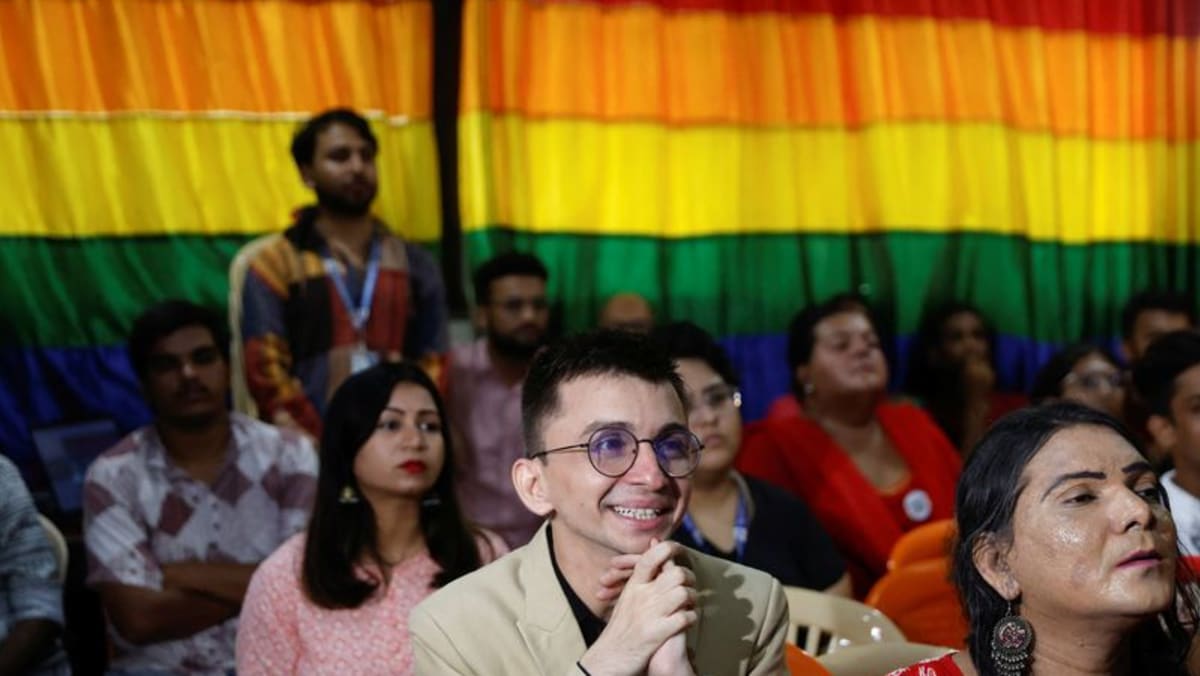NEW DELHI: Activists hoping that India’s top court would grant queer couples the right to marry the person of their choice were left disappointed after it did not do so on Tuesday (Oct 17).
India’s chief justice DY Chandrachud said the right to choose a partner “goes to the root of the right of life and liberty” protected by the Indian constitution, but the decision on whether to legalise same-sex unions was ultimately left to parliament.
The verdict has drawn criticism for being discriminatory and not giving basic rights to the group, with some saying the Supreme Court did not do its job of protecting the marginalised community’s rights.
The Supreme Court has asked the government to form a committee with the aim of granting rights relating to adoption, succession, and forming civil unions to queer couples.
Activists said the result does not move the needle on civil liberties for lesbian, gay, bisexual, transgender and queer (LGBTQ) people.
While it is now lawful in various parts of the world, most countries in Asia remain opposed to legalising same-sex marriage.
The court ruling came five years after a historic 2018 judgment, when the Supreme Court scrapped a colonial-era ban on gay sex.
FIGHTING THE LONG BATTLE
In a filing to the Supreme Court in March, the Indian government opposed recognising same-sex marriages, urging the court to reject challenges to the current legal framework lodged by the LGBTQ community.
However, the community said that they deserve more.
“The government has to do positive things for us if they want our vote. We vote right? So we also have rights, we also have demands, we’re also human. So we should have this fundamental right, this constitutional right, correct?” asked queer activist Siddhant Roy.
For many, like same-sex union petitioner Utkarsh Saxena and his partner Ananya Kotya, the battle for the right to marry to be made a fundamental right has been a long one.
One of their key demands was that the court amend India’s Special Marriages Act to read the word “spouse” as a gender-neutral term. The legal fight is also about receiving the same benefits as heterosexual couples.
Mr Kotya noted that he would not be covered under Mr Saxena’s job insurance, whereas the benefit is provided to married couples.
“If we transfer money to each other, we worry about gift tax and things like that,” he added, referring to a tax that is levied on recipients for gifts exceeding the value of 50,000 rupees (US$601) in a financial year.
However those who receive such gifts from parents, spouse, siblings, or other close relatives are not liable to pay the tax no matter what the value of the gift.
HOPING FOR A FAVOURABLE OUTCOME
Same-sex unions continue to divide opinions, with some opposing the idea in the name of protecting the institution of marriage.
“Homosexual people are only out there to challenge the norms of the society and to challenge the laws of nature designed by god,” said Mr Vishnu Gupta, national president of right-wing organisation Hindu Sena.
While authorities and other groups have historically opposed the idea of same-sex marriage, saying it goes against the fundamental idea of a family, many in the LGBTQ community are still hoping for a favourable outcome.
Some in the queer community said the Supreme Court’s verdict is encouraging because it does recognise some rights for them.
Mr Saxena said there has been progress.
“When I was growing up as a queer kid in India, I would have never imagined a day when there would be such an open and safe discussion around queer rights,” he added.
“We’re not worried about our safety, this has become a dining table conversation. And I think that’s a huge victory.”



